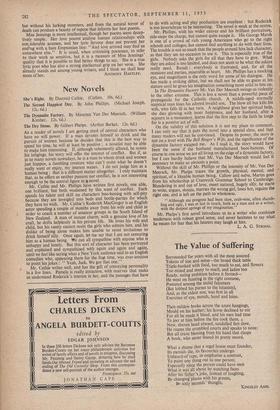New Novels
She's Right. By Diarmid Cathie. (Collins. 10s. 6d.) The Dynamite Factory. By Maxence Van Der Meersch. (William Kimber. 12s. 6d.)
As a reader of novels I am getting tired of central characters who have no will power. If a man devotes himself to drink and the pursuit of women because he decides that this is the best way to spend his time, he will at least be positive ; a novelist may be able to make him interesting. If, although vehemently allured, he resists his longings, his story will offer the interest of conflict. But if, as in so many novels nowadays, he is a man to whom drink and women just happen, a fumbling creature who can't resist what he doesn't really want or enjoy, my interest wanes. I do not judge him as a human being ; that is a different matter altogether. I only maintain that, as he offers us neither passion nor conflict, he is not interesting enough to be the central figure in a novel.
Mr. Cathie and Mr. Phillips have written first novels, one able, one brilliant, but both weakened by this want of conflict. Each spends his talent and skill on characters boo-hooing with self-pity because they are inveigled into beds and bottle-parties for which they have no wish. Mr. Cathie's Roderick MacGregor is an English actor spending a couple of months away from his wife and child in order to coach a number of amateur groups in the South Island of New Zealand. A man of instant charm, with a genuine love of his craft, he drifts helplessly in his private life. He loves his wife and child, but his vanity cannot resist the girls who admire him, and his dislike of being alone makes him unable to resist invitations to drink himself silly. Once again, let me say that I am not censuring him as a human being. We can all sympathise with anyone who is unhappy and lonely. But this sort of character has been portrayed and explained and sympathised with again and again and again, until we feel like saying what a New York audience said to an English comedian who, appearing there for the first time, was over-anxious to point his jokes : " Yeah, Jack. We got that one."
Mr. Cathie writes well, and has the gift of conveying personality in a few lines. Pamela is really attractive, with reserves that make us understand Roderick's interest in her, and the passages that have to do with acting and play production are excellent : but Roderick is too invertebrate to be interesting. The novel is weak at the centre.
Mr. Phillips, with his wider canvas and his brilliant portraiture, side-steps the charge, but cannot quite escape it. His George Marsh is one of a crowd of rich young Americans who go to the right schools and colleges, but cannot find anything to do with their lives. The trouble is not so much that the people around him lack character, as that they see no occasion to use it. This is especially true of the girls. Nobody asks the girls for all that they have to give. What they are asked is too limited, and does not seem to be what the askers really need. Result : everybody is frustrated, and, for all the reunions and parties, miserable at heart. Mr. Phillips has a mocking eye, and magnificent is the only word for some of his dialogue. He has made a striking debut, but we shall not be able to guess at his stature until he gives his imagination something more solid to bite on.
In The Dynamite Factory Mr. Van Der Meersch swings us violently to the other extreme. This is less a novel than a powerful piece of propaganda for the Catholic church. A middle-aged normally sceptical man loses his adored invalid son. The blow all but kills his wife, who falls ill in her turn. A neighbour gives her spiritual help, she dies glowing with inner happiness, and her husband, after a sojourn in a monastery, learns that the first step to the faith he longs for is a positive act of will.
On the validity of this solution it is not my place to comment. I can only say that it puts the novel into a special class, and that many readers will not be convinced. Despite its power, the story is not on a level with The Bell Ringer's Wife, and the significance of the dynamite factory escaped me. As I read it, the story would have been the same if the husband manufactured boot-buttons. Of course in one sense we are all living on the edge of a dynamite factory, but I can hardly believe that Mr. Van Der Meersch would feel it necessary to make so obvious a point.
Without the skill of Mr. Phillips or the intensity of Mr. Van Der Meersch, Mr. Phelps traces the growth, physical, mental, and spiritual, of a likeable human being. Callow and naive, Martin goes from his scholarship at Cranwyck Grammar School to Cambridge. Blundering in and out of love, sweet natured, hugely silly, he starts to write, argues, shouts, marries the wrong girl, loses her, regains the right one, and is left on the path to wholeness.
" Although my progress in been slow, crab-wise, often shamb- ling and ugly, I was at last n touch, both as a man and as a writer, with the deepest springs of my imagination."
Mr. Phelps's first novel introduces us to a writer who combines tenderness with robust good sense, and never hesitates to say what he means for fear that his hearers may laugh at him.
L. A. G. STRONG.


































 Previous page
Previous page